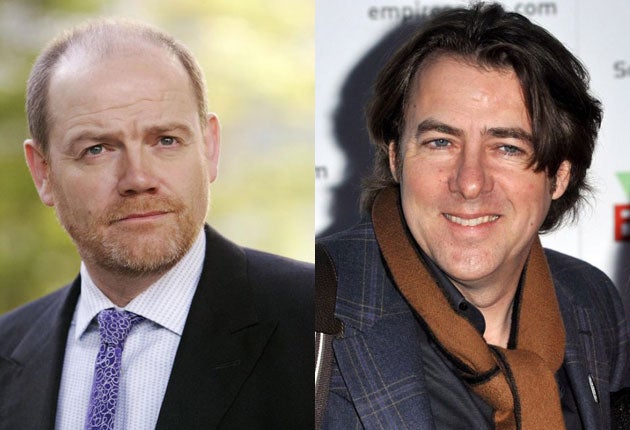BBC to trim stars' massive pay deals

Your support helps us to tell the story
From reproductive rights to climate change to Big Tech, The Independent is on the ground when the story is developing. Whether it's investigating the financials of Elon Musk's pro-Trump PAC or producing our latest documentary, 'The A Word', which shines a light on the American women fighting for reproductive rights, we know how important it is to parse out the facts from the messaging.
At such a critical moment in US history, we need reporters on the ground. Your donation allows us to keep sending journalists to speak to both sides of the story.
The Independent is trusted by Americans across the entire political spectrum. And unlike many other quality news outlets, we choose not to lock Americans out of our reporting and analysis with paywalls. We believe quality journalism should be available to everyone, paid for by those who can afford it.
Your support makes all the difference.The BBC is to trim the massive pay deals it uses to attract top stars after the storm caused by the antics of Jonathan Ross and Russell Brand.
Mark Thompson, the director general, warned that economies were planned at all levels of the corporation – including the budget for big-name celebrities. The BBC faced anger two years ago when it made Ross its top-paid star on a three-year contract of £18m. He has been suspended without pay for 12 weeks – and will lose £1.4m – for his part in leaving a series of crude messages on the answering machine of the actor Andrew Sachs.
Mr Thompson said yesterday: "I think we are heading towards a period where it is probably the case that we will be able to secure the best entertainment talent for less than we have been able to do in the past few years."
He was speaking after a week of disastrous publicity for the BBC leading to the resignations of Brand and Lesley Douglas, the controller of Radio 2.
The director general told BBC1's Andrew Marr Show: "We go through periods of sharp upward inflation but we sometimes go through periods where there is retrenchment. This is quite a difficult period. Inflation is much higher than the licence fee, the sale of commercial property is harder, so we are looking at expenditure to make sure that if we can save money we will."
He added: "The market is changing. What we do every year is look closely at labour markets, what is happening to remuneration in commercial television, radio and the market for stars and talent, and try to get the best deal."
Calling Ross an "outstanding broadcaster", Mr Thompson said he hoped he would return after his suspension.
His predecessor as director general, Greg Dyke, said: "If the BBC is to pay enormous sums to artists, such as the £6m a year to Ross, then it must understand it will lose public support. There is always a price that is too high for a publicly-funded organisation."
Ross is by the far the best-paid BBC employee, followed by Graham Norton on £2.5m a year, Gary Lineker on £1.5m and Jeremy Paxman on just over £1m.
Information released to The News of the World under the Freedom of Information Act disclosed that 50 of the corporation's managers are paid at least £160,000 a year. Mr Thompson's salary is £816,000, while Jana Bennett, the director of BBC Vision, earns £536,000 and Mark Byford, the deputy director general, earns £513,000. John Whittingdale, the chairman of the Commons culture select committee, said: "It's almost impossible to imagine a commercial broadcaster being capable of these kinds of salaries."
Michael Parkinson, the chat show host, had little sympathy for Brand, whom, he said, was "generously called a comedian". He said Ross would be back but added: "Jonathan should have more oil in his lamp, more sense. He's very good but given to fits of madness."
A Conservative government would attempt to "rein in" the BBC by possibly cutting the licence fee. The party last night confirmed it was examining the plan within a wide-ranging review of the BBC's future. One proposal is to cut the licence fee by £6 a year. There is hostility among MPs in the party to the BBC, with some MPs viewing it as a liberal-leaning state monopoly.
David Cameron, the Conservative leader, is believed to favour retention of the licence fee but with a stronger system of accountability. A Conservative spokesman said: "We are considering options with regards to the licence fee but haven't ruled anything in or out."
Subscribe to Independent Premium to bookmark this article
Want to bookmark your favourite articles and stories to read or reference later? Start your Independent Premium subscription today.
Join our commenting forum
Join thought-provoking conversations, follow other Independent readers and see their replies
Comments